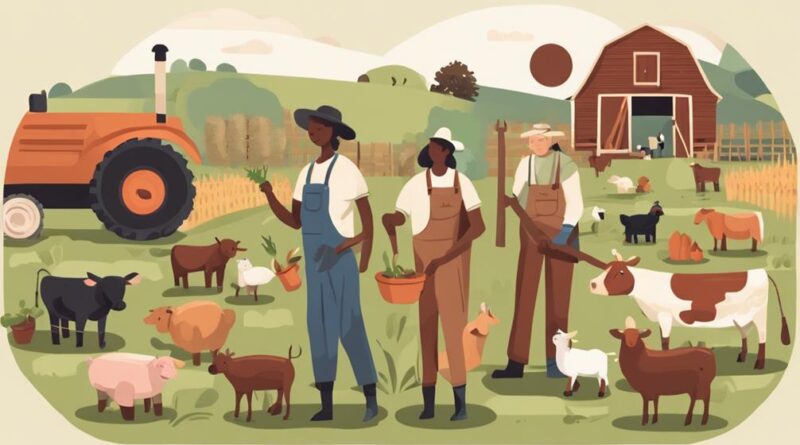Five Tips for Ethical Farming and Labor Practices
Imagine ethical farming practices as the compass guiding your farm's journey towards sustainability and responsibility, much like a lighthouse guiding ships to safety in the dark.
You may wonder how to navigate this complex terrain and ensure you're on the right path. By exploring five key tips for ethical farming and labor practices, you can cultivate a farm that not only thrives but also upholds values that benefit both people and the planet.
Importance of Ethical Farming Practices
Understanding the critical importance of ethical farming practices is essential for creating sustainable and responsible agricultural systems. Environmental stewardship plays a key role in ethical farming, emphasizing the need to protect and preserve natural resources for future generations. By implementing practices that prioritize environmental stewardship, such as crop rotation, water conservation, and reducing chemical inputs, farmers can minimize their impact on the land while promoting long-term sustainability.
In addition to environmental stewardship, ethical farming also encompasses the concept of animal welfare. Treating animals humanely isn't only the right thing to do but also contributes to the overall quality of the products produced. Practices such as providing adequate living conditions, access to pasture, and veterinary care all fall under the umbrella of ethical farming in terms of animal welfare. By prioritizing the well-being of livestock, farmers can ensure that their animals lead healthy and comfortable lives.
Ensuring Fair Wages for Farm Workers
To uphold ethical farming practices, it's crucial to ensure that farm workers receive fair wages for their labor. Fair compensation isn't just a matter of ethics; it's a fundamental aspect of respecting labor rights. By providing farm workers with fair wages, farmers contribute to the overall well-being of their workers and their families.
Fair compensation acknowledges the hard work and dedication that farm workers put into cultivating and harvesting crops. It signifies a commitment to treating workers with dignity and respect, valuing their contributions to the agricultural industry. Ensuring fair wages also fosters a positive work environment, boosting employee morale and motivation.
In addition to fulfilling moral obligations, fair compensation for farm workers can lead to increased productivity and quality of work. When workers feel valued and fairly compensated, they're more likely to be invested in their tasks, leading to better outcomes for the farm operation as a whole. Fair wages can also help attract and retain skilled workers, contributing to the long-term success and sustainability of the farm.
Sustainable Use of Resources
Sustainably managing resources on the farm requires efficient utilization and responsible stewardship of natural assets. Resource conservation is key to ensuring the long-term viability of your farm while minimizing environmental impact. Implementing eco-friendly methods such as water recycling systems, renewable energy sources, and organic fertilizers can help reduce waste and promote sustainability.
To conserve resources effectively, consider using precision farming techniques like drip irrigation to optimize water usage. This method delivers water directly to the roots of plants, reducing water waste and increasing efficiency. Additionally, rotating crops and practicing intercropping can help maintain soil health and fertility, reducing the need for synthetic fertilizers and pesticides.
When it comes to energy consumption, incorporating solar panels or wind turbines can provide a renewable energy source for your farm operations. Not only does this reduce your carbon footprint, but it also helps lower energy costs in the long run. Furthermore, composting organic waste materials can create nutrient-rich soil amendments, promoting healthy plant growth without relying on chemical inputs.
Promoting Biodiversity on Farms
Promoting biodiversity on farms is crucial for enhancing ecosystem resilience and supporting a healthy balance of plant and animal species. Conservation efforts play a significant role in maintaining biodiversity. By implementing practices such as crop rotation, where different crops are planted in a cyclical manner, you can prevent soil degradation, reduce the risk of pests and diseases, and improve soil fertility. This method also helps in preserving genetic diversity within plant species, contributing to overall ecosystem health.
Creating wildlife habitats within and around your farm is another essential aspect of promoting biodiversity. By setting aside areas for native vegetation and incorporating elements like hedgerows, ponds, or wildflower strips, you can provide shelter and food sources for a variety of wildlife species. Additionally, planting pollinator-friendly flowers helps support essential insect populations like bees and butterflies, which play a crucial role in pollination.
Incorporating these practices not only benefits the environment but also positively impacts the productivity and sustainability of your farm. By fostering a diverse ecosystem, you create a more resilient and balanced agricultural system that's less susceptible to external threats. Remember, promoting biodiversity isn't just about the number of species but about creating a harmonious environment where each component plays a vital role in the overall functioning of the farm.
Implementing Safe Working Conditions
Enhancing the well-being of farm workers through the implementation of safe working conditions is a fundamental aspect of ethical farming practices. To ensure a safe environment for your workers, consider the following tips:
- Improving Ventilation: Proper ventilation is crucial in areas where workers are exposed to dust, chemicals, or other harmful substances. Installing fans or ventilation systems can help maintain good air quality and reduce the risk of respiratory issues.
- Providing Proper Training: It's essential to offer comprehensive training to all farm workers on how to safely operate machinery, handle chemicals, and perform tasks to prevent accidents and injuries. Regular refresher courses can help reinforce safety protocols.
- Maintaining Equipment: Regular maintenance of farm equipment is vital to prevent malfunctions that could endanger workers. Encourage workers to report any faulty machinery immediately for repairs.
- Implementing Safety Protocols: Develop and enforce safety protocols such as wearing protective gear, following proper lifting techniques, and establishing emergency procedures. Make sure all workers are aware of these protocols.
- Creating a Supportive Culture: Foster a work environment where workers feel comfortable raising safety concerns without fear of retribution. Encourage open communication and address any safety issues promptly to show your commitment to their well-being.
Supporting Local Communities
To foster a sense of unity and reciprocity, consider how you can actively engage and uplift the local communities surrounding your farm. Community engagement plays a vital role in creating a mutually beneficial relationship between your farm and the people living nearby. By involving locals in your farming practices, such as organizing community events or workshops, you can strengthen bonds and build trust within the area. This not only fosters a positive image for your farm but also contributes to the overall well-being of the community.
Furthermore, supporting local economic development is crucial for sustainable farming practices. By sourcing supplies and services from nearby businesses, you can help stimulate the local economy. This collaborative effort can lead to job creation, increased revenue, and a more prosperous community overall. Additionally, investing in local infrastructure projects or supporting educational initiatives can further enhance economic growth in the area.
Transparency in Supply Chains

Ensuring transparency in your farm's supply chains is essential for building trust and accountability within your operations. By being open and clear about where your products come from and how they're produced, you can demonstrate a commitment to ethical practices and fair treatment of workers.
Here are some key points to consider when focusing on transparency in your supply chains:
- Traceability: Implement systems that allow you to trace your products back to their sources. This helps ensure that labor rights are respected throughout the production process.
- Supplier Audits: Regularly audit your suppliers to verify compliance with labor rights standards and ethical practices.
- Communication: Maintain open communication channels with your suppliers to address any concerns regarding labor rights and supply chain transparency promptly.
- Public Reporting: Consider publishing reports on your supply chain practices to showcase your commitment to transparency and accountability.
- Collaboration: Work with other stakeholders in the industry to share best practices and improve supply chain transparency collectively.
Certification and Verification Processes
To ensure the credibility of your ethical farming practices and labor standards, establish robust certification and verification processes within your supply chains. Verification procedures play a crucial role in confirming that your operations align with ethical sourcing and labor rights. By implementing certification standards, you demonstrate a commitment to transparency and accountability in your agricultural practices.
When developing your certification and verification processes, prioritize clarity and precision. Clearly outline the criteria that define ethical sourcing and adhere to established labor rights. Regularly review and update these standards to stay current with industry best practices and evolving ethical guidelines.
Engage with reputable third-party organizations to validate your compliance with certification standards. These external audits provide an unbiased assessment of your farming and labor practices, enhancing your credibility and trustworthiness in the eyes of consumers and stakeholders.
Integrate feedback from verification procedures into continuous improvement efforts. Use the insights gained from audits to identify areas for enhancement and implement corrective actions swiftly. Embrace a culture of ongoing evaluation and refinement to ensure that your ethical farming and labor practices remain at the forefront of industry standards.
Frequently Asked Questions
How Do Ethical Farming Practices Impact the Overall Quality and Safety of the Produce?
Ethical farming practices directly impact consumers by ensuring that the produce they consume is of high quality and safe for consumption.
Transparency in farming practices builds trust between consumers and producers, allowing for better understanding of where their food comes from and how it's produced.
This knowledge empowers consumers to make informed choices, leading to a healthier and more sustainable food system overall.
What Measures Can Be Taken to Prevent Exploitation of Migrant Workers in the Farming Industry?
To prevent exploitation of migrant workers in farming, ensure fair wages and uphold worker rights.
Comply with immigration and labor laws to protect vulnerable workers.
Prioritize ethical treatment and equality in the workplace to create a safe and respectful environment.
How Can Farmers Ensure That Their Use of Resources Is Truly Sustainable in the Long Term?
To ensure long-term sustainability, focus on soil health and crop rotation. By rotating crops, you can prevent soil depletion and maintain fertility.
Implement water conservation practices and boost energy efficiency to reduce environmental impact.
These steps will help you preserve resources for the future while maintaining a sustainable farming operation.
What Specific Actions Can Farmers Take to Promote Biodiversity on Their Farms, Beyond Simply Avoiding Monoculture?
To promote biodiversity on your farm, try crop rotation to diversify crops and soil health. Restore habitats for wildlife and pollinators to thrive. By planting native plants and creating natural spaces, you can enhance biodiversity beyond monoculture.
Incorporating these practices not only benefits the environment but also boosts your farm's resilience and sustainability in the long run.
Are There Any Tools or Resources Available to Help Farmers Improve and Maintain Safe Working Conditions on Their Farms?
To improve and maintain safe working conditions on your farm, consider utilizing tools like safety audits and technology solutions.
Worker empowerment through training programs can also help create a culture of safety.
These resources can provide valuable insights and assistance in ensuring that your farm is a safe and healthy environment for everyone involved in the labor process.
Conclusion
When it comes to ethical farming and labor practices, it's crucial to prioritize:
- Fair wages
- Sustainable resource use
- Biodiversity
- Safe working conditions
- Supporting local communities
By implementing these practices, you can ensure the well-being of farm workers, protect the environment, and contribute to a more ethical and sustainable food system.
Remember, transparency and certification processes play a key role in verifying these practices are being followed.
Make a difference by choosing ethically produced products.
